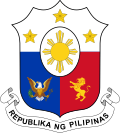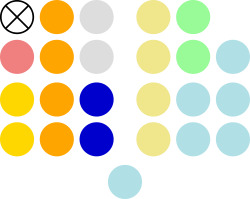| 13th Congress of the Philippines | |||||
|---|---|---|---|---|---|
| |||||
 | |||||
| Overview | |||||
| Term | July 26, 2004 – June 8, 2007 | ||||
| President | Gloria Macapagal Arroyo | ||||
| Vice President | Noli de Castro | ||||
| Senate | |||||
| Members | 24 | ||||
| President |
| ||||
| President pro tempore | Juan Flavier | ||||
| Majority leader | Francis Pangilinan | ||||
| Minority leader | Aquilino Pimentel Jr. | ||||
| House of Representatives | |||||
| Members | 261 | ||||
| Speaker | Jose de Venecia Jr. | ||||
| Deputy Speakers |
| ||||
| Majority leader | Prospero Nograles | ||||
| Minority leader | Francis Escudero | ||||
 |
|---|
The 13th Congress of the Philippines (Filipino : Ikalabintatlong Kongreso ng Pilipinas), composed of the Philippine Senate and House of Representatives, met from July 26, 2004, until June 8, 2007, during the fourth, fifth, and sixth years of Gloria Macapagal Arroyo's presidency. The convening of the 13th Congress followed the 2004 national elections, which replaced half of the Senate membership and the entire membership of the House of Representatives.





